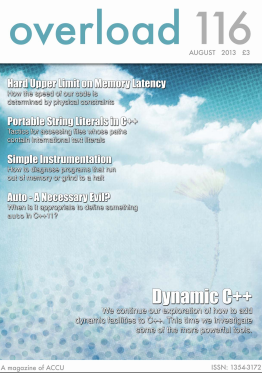Functional C++: Type Classes -- whanhee
A nice series on functional programming in C++
Functional C++: Type Classes
by whanhee
From the article
Type classes are a feature of Haskell which is very similar to the upcoming Concepts. Both define interfaces to a data type, which can be defined separately from the data, in contrast to member functions...

 A nice comparison on converting a string to int:
A nice comparison on converting a string to int:
 Today in Dr. Dobb's:
Today in Dr. Dobb's: The solution to the latest GotW problem is now available:
The solution to the latest GotW problem is now available: Libc++ now has a status page for the C++1Y/C++14 implementation. You can follow along here to see when your favorite features are implemented:
Libc++ now has a status page for the C++1Y/C++14 implementation. You can follow along here to see when your favorite features are implemented: New on Code Project:
New on Code Project: This open source REST SDK also supports Linux...
This open source REST SDK also supports Linux...